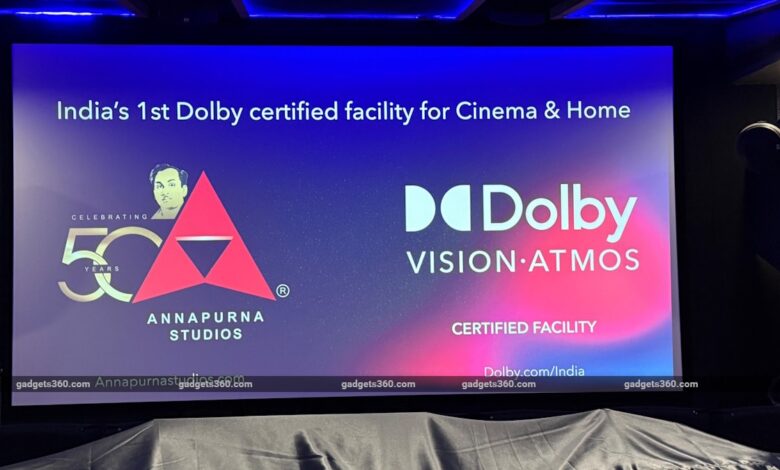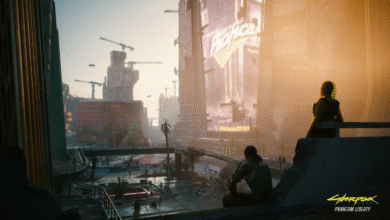India’s First Dolby Vision Post-Production Facility at Annapurna Studios Unlocks New Creative Possibilities for Filmmakers

Dolby Atmos has been a household name in India for years. If you’ve recently bought a smartphone, laptop, or smart TV, it probably comes with Dolby Atmos support. The best part is that we can now experience Dolby Vision and Atmos in live sports events like the recently concluded Champions Trophy, which India lifted in 2025, and Wimbledon – transforming how fans experience live events at home. Of course, you still need a Dolby Vision and Dolby Atmos-enabled device to enhance your viewing experience. At the same time, you can find over 1,000 Dolby Atmos screens and plenty of content to consume online. Dolby is already working on its next big frontier and has collaborated with Annapurna Studios in Hyderabad to bring up India’s first Dolby-certified facility for cinema and home. The collaboration not only opens up new horizons for studios but also prioritises the needs of filmmakers.
Ashim Mathur, Vice President – Marketing for APAC at Dolby Laboratories, while discussing Dolby Vision, stated that the company is already working on an outreach programme that will help spread the word. Speaking on the collaboration with Annapurna Studios, Mathur added that facilities like this will help bring filmmakers’ vision to life, and the right cinemas will help users consume such content the way it is intended.
Dolby Vision post-production facility: Technical details, mixing rundown
Talking about technical aspects, particularly Dolby Vision and HLG, a Dolby engineer explained that Dolby Vision uses PQ, short for Perceptual Quantizer, for HDR, offering a dynamic range 40x brighter and 10x darker than the standard dynamic range. Hybrid log gamma technology, or long for HLG, developed by DVC and NHK, is suitable for broadcast and OTT platforms, but it has a lower contrast ratio when compared to PQ.
![]()
Dolby Atmos mixing unit at Annapurna Studios in Hyderabad
The engineer also talked about the importance of colour correction software like Baselight and DaVinci Resolve. And the role of transfer functions in camera technology, and the benefits of Dolby Atmos for immersive audio experiences in cinemas.
Discussing peak brightness in Dolby Vision cinema projection, the Dolby engineer noted that it’s 108 nits at 12 bits in cinemas and 1000 nits for Smart TVs at home. The engineer explained the concept of Atmos mixing and emphasised the importance of stage (bed) speakers and the object (atmos elements). The object element allows sound to move freely within the room, enhancing the audience’s experience. The entire setup comprises 128 channels of audio, with the first four channels dedicated to the bed and the remaining channels allocated to objects. The engineer clarified that the main elements of the film, such as heavy music and dynamic sounds, are typically placed in the bed channel.
![]()
Dolby Vision projection system by Christie Digital
When asked about the difference in approach taken for theatre and OTT, the engineer explained that the mixing room is set up for theatre, while an OTT room is used for different monitoring and loudness levels. He added that each OTT platform has its norms, and the mix is adjusted accordingly to meet those requirements. However, it is important to maintain a comfortable balance that works well for both theatre and OTT releases.
The engineer added that even the blacks are always dynamically controlled by Dolby Vision, whether it is for a Dolby cinema projector. He stressed the consistency of quality across different screen sizes and the advantages of Dolby Atmos for Dolby Cinema, emphasizing the studio-grade audio quality and its transferability to exhibitions.
Much like the Dolby Atmos adoption, which steadily picked up pace, we expect the Dolby Vision to become the next big thing for filmmakers and will see more pickup in some time. Mathur said that Annapurna Studios will be a marquee example for other production houses and may follow suit.
![]()
(From left to right): Nagarjuna, actor and co-owner of Annapurna Studios, and Ashim Mathur, Vice-President Marketing for APAC, Dolby
Annapurna Studio: The legacy studio
Annapurna Studio in Hyderabad completed the 50-year milestone in 2025 and was established by veteran actor Akkineni Nageswara Rao (ANR) in 1975; it was named after ANR’s wife, Annapurna. The studio, initially with non-air-conditioned sound stages, has grown to 12 fully equipped air-conditioned stages, serving over 5,000 films and producing more than 60. It introduced new technologies, like Dolby Cinema, which required significant investments, especially during COVID-19.
Annapurna Studio also expanded into virtual production technology during COVID-19 and was inspired by the success of series like “The Mandalorian” on Disney+. It now offers comprehensive post-production services, handling projects from editing to visual effects, aiming to be a one-stop shop for filmmakers.
Annapurna Studios has handled mixing for popular movies like Pushpa and Pushpa 2. Gadgets 360 was among the select media that experienced the state-of-the-art Dolby Atmos mix rooms. The facility features a cutting-edge Dolby Vision projection system developed by Christie Digital Systems, a long-standing partner of Dolby.
![]()
A shooting space at Annapurna Studios in Hyderabad
Dolby and Annapurna Studios collab is just the first in many
Nagarjuna Akkineni, actor and co-owner of Annapurna Studios, discussed the investments into developing a one-stop solution for filmmakers. He touched upon the importance of expanding the studio space and the potential for new stories to be told in darker settings with advanced technology like Dolby Vision. Nagarjuna stressed the benefits of technologies like Vision, which will help filmmakers bring new storytelling techniques alongside infrastructure improvements in theatres and the impact on production quality. He also talked about the passion and dedication of filmmakers to adopt advanced technology.
As an example of how extensive work goes around movie launches, Nagarjuna discussed the considerable time spent mastering trailers, which play a crucial role in movie launches.
Nagarjuna also talked about the passion and approach some filmmakers take to perfect their projects. “I believe Mr S. S. Rajamouli is the one person who really pushed the limits at that point for the RRR movie. He went through so many iterations and corrections for RRR and was also learning on the go, but that’s what passionate filmmakers think that this can be done and achieved.”
Talking about the studio’s early days, he recounted the challenges faced during the construction of Annapurna Studios, including an encounter with a snake.
Mathur talked about the potential for more Dolby Vision screens in India. “We believe that this facility, which is now operational and with more content being added, will serve as a valuable reference point for exhibitors who are also deciding whether to make the shift,” Mathur added.
Dolby has vast plans, and we can expect to hear more from them this year, including some new collaborations for Dolby Vision.




